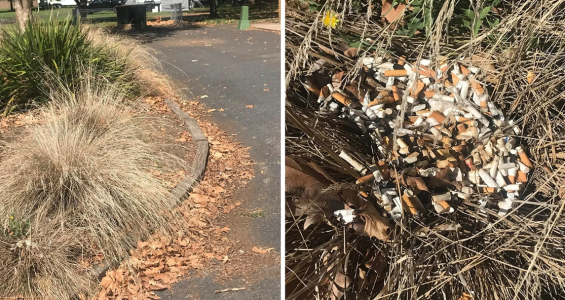Aussie traveller makes unsettling discovery at caravan park—rethink your next trip
By
- Replies 10
Australians have a strong connection to the outdoors, with many enjoying relaxing and exploring nature.
Caravan parks and camping spots are often seen as peaceful escapes. However, a recent experience has drawn attention to an unfortunate reality that sometimes disrupts these settings.
While staying at a park, one traveller came across a surprising and unsightly mess hidden in the grass—reminding us that not everyone treats these spaces with the care they deserve.
The traveller took to social media to share images of the 'filthy' find, sparking outrage and disappointment among fellow nature lovers.
'There's a lot of scum out there,' the man lamented in a now-deleted post that resonated with other travellers.
Responses ranged from disgust to frustration, with one person labeling the act as 'filth' and another commenting, 'Some people are just born tossers.'
This incident in Tumut, in the NSW Riverina, is not isolated.
A brief survey of Melbourne’s suburban train stations and Sydney's eastern beaches reveals a similar pattern of carelessness, with cigarette butts littering gardens, footpaths, and sands—often ranking second only to bottle caps in terms of volume.
Despite a decline in smoking rates across Australia, cigarette butts remain the most littered item globally, with an estimated 4.5 trillion discarded each year.
Many smokers may not realise that these butts are not just unsightly; they contain harmful chemicals and small plastics that can wreak havoc on our ecosystems.
They contaminate soil and water, threatening land animals and marine life, which can mistake these toxic items for food.
Heartbreaking images of a quokka nibbling on a cigarette butt and a shorebird feeding one to its chick underscore the gravity of this issue.
The environmental impact of cigarette butts is long-lasting, with some lasting for decades in the environment.
In 2021, a WWF-Australia report suggested that a stewardship program could be a significant step forward, short of banning plastic cigarette filters.
This program would hold tobacco companies accountable for the waste their products create, shifting the financial burden of cleanup from taxpayers to the manufacturers.
Jeff Angel, the founder of the Total Environment Centre, strongly advocated for holding manufacturers responsible.
'For too long governments have been reticent to take effective action, and it's about time they ignored the tobacco lobby and became more concerned about ever-present and accumulating impacts on the environment,' he said.
He argued that cigarette butts should ultimately be banned, as there is scant evidence of their positive health outcomes.
This incident serves as a stark reminder of our responsibility to preserve the environment.
As members of the Seniors Discount Club, we understand the importance of leaving a legacy of a clean and healthy planet for future generations.
We encourage our readers to be vigilant and proactive in responsibly disposing of waste and advocate for policies that will ensure the beauty of Australia's natural landscapes remains unspoiled.

Have you encountered similar problems on your travels? What solutions do you think could help address this widespread problem? Share your experiences and ideas in the comments below, and let's work together to keep Australia beautiful.
Caravan parks and camping spots are often seen as peaceful escapes. However, a recent experience has drawn attention to an unfortunate reality that sometimes disrupts these settings.
While staying at a park, one traveller came across a surprising and unsightly mess hidden in the grass—reminding us that not everyone treats these spaces with the care they deserve.
The traveller took to social media to share images of the 'filthy' find, sparking outrage and disappointment among fellow nature lovers.
'There's a lot of scum out there,' the man lamented in a now-deleted post that resonated with other travellers.
Responses ranged from disgust to frustration, with one person labeling the act as 'filth' and another commenting, 'Some people are just born tossers.'
This incident in Tumut, in the NSW Riverina, is not isolated.
A brief survey of Melbourne’s suburban train stations and Sydney's eastern beaches reveals a similar pattern of carelessness, with cigarette butts littering gardens, footpaths, and sands—often ranking second only to bottle caps in terms of volume.
Despite a decline in smoking rates across Australia, cigarette butts remain the most littered item globally, with an estimated 4.5 trillion discarded each year.
Many smokers may not realise that these butts are not just unsightly; they contain harmful chemicals and small plastics that can wreak havoc on our ecosystems.
They contaminate soil and water, threatening land animals and marine life, which can mistake these toxic items for food.
Heartbreaking images of a quokka nibbling on a cigarette butt and a shorebird feeding one to its chick underscore the gravity of this issue.
The environmental impact of cigarette butts is long-lasting, with some lasting for decades in the environment.
In 2021, a WWF-Australia report suggested that a stewardship program could be a significant step forward, short of banning plastic cigarette filters.
This program would hold tobacco companies accountable for the waste their products create, shifting the financial burden of cleanup from taxpayers to the manufacturers.
Jeff Angel, the founder of the Total Environment Centre, strongly advocated for holding manufacturers responsible.
'For too long governments have been reticent to take effective action, and it's about time they ignored the tobacco lobby and became more concerned about ever-present and accumulating impacts on the environment,' he said.
He argued that cigarette butts should ultimately be banned, as there is scant evidence of their positive health outcomes.
This incident serves as a stark reminder of our responsibility to preserve the environment.
As members of the Seniors Discount Club, we understand the importance of leaving a legacy of a clean and healthy planet for future generations.
We encourage our readers to be vigilant and proactive in responsibly disposing of waste and advocate for policies that will ensure the beauty of Australia's natural landscapes remains unspoiled.
Key Takeaways
- An Aussie traveller discovered hundreds of cigarette butts dumped in bushes at a caravan park, near rubbish bins.
- The problem of littered cigarette butts is widespread, with numerous instances reported across different locations.
- Cigarette butts are the most littered item globally and contain harmful chemicals that can impact soil, water, and wildlife.
- There are calls for tobacco companies to be held responsible for the waste their products create and suggestions for a stewardship program to address the issue.








